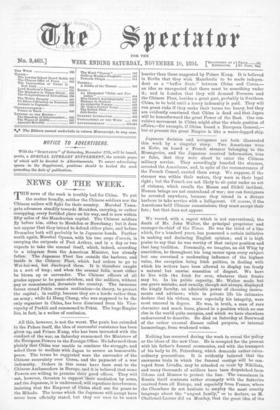All this, however, is not the worst. The panic has
extended to the Palace itself, the idea of successful resistance has been given up, and Prince Kung, who has been intrusted with the conduct of the war, on Saturday summoned the Ministers of the European Powers to the Foreign Office. He informed them plainly that China was unable to continue the struggle, and asked them to mediate with Japan to secure an honourable peace. The terms he suggested were the surrender of the Chinese suzerainty over Corea, and the payment of a war indemnity. Orders in this sense have been sent to the Chinese Ambassadors in Europe, and it is believed that some Powers are willing to promise their good offices. They will not, however, threaten to support their mediation by arms, and the Japanese, it is understood, will repudiate interference, insisting that the Emperor of China shall sue for peace to the Mikado. The terms which the Japanese will accept have never been officially stated, but they are sure to be much
heavier than those suggested by Prince Kung. It is believed in Berlin that they wish Manchuria to be made indepen- dent as a "buffer State" between China and Corea,— an idea so unexpected that there must be something under it; and in London that they will demand Formosa and the Chinese Fleet, besides a great post, probably in Southern China, to be held until a heavy indemnity is paid. They will run great risks if they make their terms too heavy, but they are evidently convinced that China is dead and that Japan will be henceforward the great Power of the East. One con- vulsive movement in China might alter the whole position of affairs,—for example, if China found a European General,— but at present the great Empire is like a water-logged ship.






































